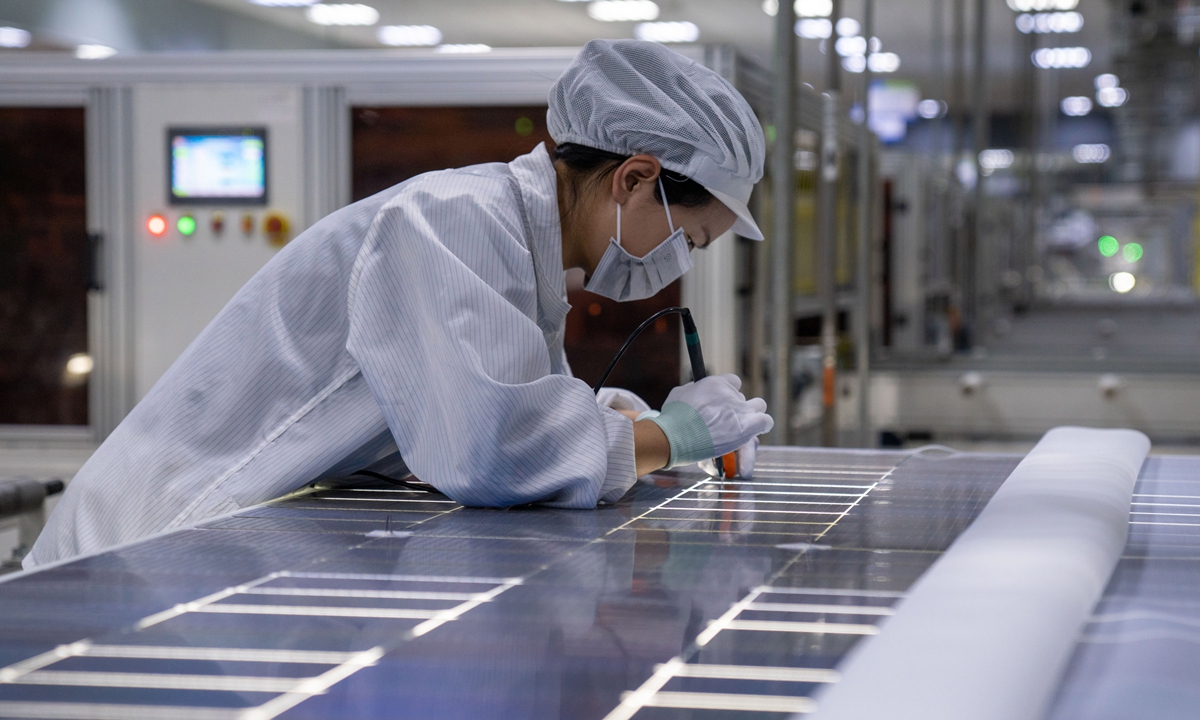A worker is checking photovoltaic modules in a company in Feidong county, Hefei, Anhui, on January 16, 2024. Photo: VCG
Chinese business associations strongly oppose abuse by the US of Section 301 to increase tariffs on Chinese products. They said that the tariff hikes would ultimately be borne by US consumers and hinder efforts to ease inflation in the US.
These statements came after Washington’s announcement on Tuesday that further increased tariffs on a variety of imports from China, including electric vehicles (EVs), lithium batteries, photovoltaic (PV) cells, critical minerals, steel and aluminum, semiconductors and port cranes, on top of existing tariffs under Section 301.
A WTO panel ruled in September 2020 that the Section 301 tariffs violated WTO rules.
The China Iron and Steel Association (CISA) on Thursday strongly opposed the US abuse of Section 301 to increase tariffs on Chinese products. It urged the US to stop politicizing steel trade and instead engage in cooperative efforts for industrial development, the association said in a statement.
“The non-market behavior of the US distorts the global steel trade order and is detrimental to the healthy development of the global steel industry. The Chinese steel industry urges the US to abandon the politicization of steel trade issues and engage in cooperation that truly benefits industrial development,” CISA said.
The CISA stressed that China’s exports of steel products to the US represented a small proportion of total exports, and the proportion of steel imports from China is also small in terms of total US steel imports.
Despite the impact of multiple US tariffs, US downstream enterprises that continue to import Chinese steel products do so based on their own market demand, the association said.
Other Chinese business organizations, including the China Chamber of Commerce for Import and Export of Machinery and Electronic Products (CCCME), also strongly opposed the US decision.
The CCCME said on Wednesday that China’s export share of EVs and PV cells to the US is minimal – EVs comprised less than 1 percent and PV cells only 0.2 percent of total exports of the same products in 2023. Therefore, the latest US tariff increase is not expected to significantly affect these industries.
However, the tariffs are likely to raise market prices, burden US consumers, and hinder global cooperation and innovation in the industry. In particular, tariffs on Chinese port cranes will significantly raise the operating costs of US ports and logistics, the CCCME said.
Among the products included in the additional tariffs in 2024, tariffs on PV products from China could have a major impact on US inflation, Tian Yun, a veteran economist based in Beijing, told the Global Times on Thursday.
“No other country can provide PV panels and equipment as cost-effectively as China. Therefore, the additional tariffs on Chinese PV products will greatly raise the cost of PV-generated electricity in the US,” Tian said.
Facts have proven that US protectionism has already backfired, and the additional tariffs have not been effective.
American consumers had paid more than $230 billion as of May 2 for tariffs since the Trump administration imposed levies on imported Chinese goods such as solar panels and steel and aluminum, according to statistics from the US Customs and Border Protection.
Additionally, the Washington Post in April reported that each year, additional tariffs on Chinese imports cost the US economy nearly 200,000 jobs and 0.25 percent of its GDP, or roughly $70 billion in annual output.
Global Times

